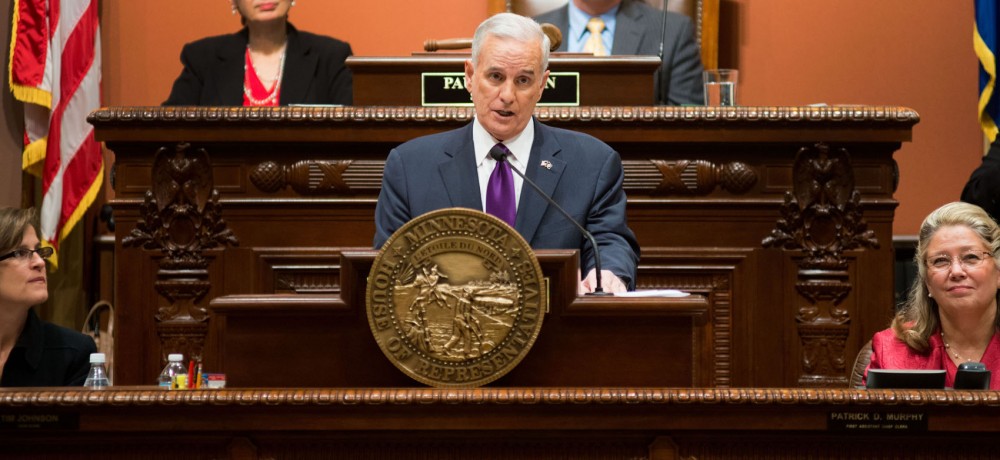Gov. Mark Dayton is looking for answers.
In his third State of the State address Wednesday night, the governor challenged legislators and state officials to offer a better plan than his for fixing Minnesota’s $1.1 billion budget shortfall.
Dayton defended his ideas for revamping the state’s tax code and increasing spending for higher education before a joint session of the Minnesota Senate and House of Representatives in the Capitol’s House chamber.
Repeatedly, the governor pointed to budget decisions of prior administrations from the past decade — noting tax cuts and unnecessary spending that he said are plaguing the state now.
For now, he said “Plan A” for the state is his proposed budget of “spending reductions and selective increases.” Plan B is sticking with Minnesota’s current plan, the status quo.
“No one would be happier than me to see a good Plan C,” he said Wednesday. “I’m still looking, and I’m sure listening.”
Besides the budget, Dayton spoke upfront about his view on legalizing same-sex marriage — a topic that got a standing ovation.
“It was so exciting to see marriage equality as the high point,” said Rep. Phyllis Kahn, DFL-Minneapolis.
The governor said defeating the marriage amendment last fall opened up the conversation for Minnesota.
“I believe that every Minnesotan should have the freedom to marry legally the person she or he loves, whether of the same or other sex,” Dayton said.
The majority of the speech focused on assigning lawmakers the task of closing the state’s impending deficit.
“Bring your work boots and your hard hats,” Dayton said.
Announced last month, the governor’s budget proposal includes boosting the state’s spending on higher education by $240 million — $80 million of which would be set aside for the University of Minnesota — and providing property tax rebates for homeowners.
Dayton said after over a decade of neglecting the state’s support for higher education and cutting spending, he is working to reverse the pattern.
Minnesota spends $569 million less on higher education compared to 16 years ago, he said.
Dayton also said Minnesota is in the middle of the pack of the 50 states for higher education spending.
“No wonder tuitions keep rising, making a Minnesota college education less and less affordable for students and their families,” he said.
To fund those higher education spending increases and property tax rebates, the governor proposed raising income taxes on the wealthiest 2 percent of Minnesotans and broadening the state’s sales tax.
He openly addressed critics of his budget proposal while stressing the importance of working together to achieve a greater result.
“My proposals have already aroused considerable controversy,” Dayton said. “Such debate is healthy in our democracy. The genius of our system of governance is that no one gets to have it all her or his way — starting with the governor.”
DFL lawmakers showed mild support for Dayton’s proposed revamp of the state’s tax system when the budget proposal was first released but weren’t completely sold on it.
Wednesday night, signs of their displeasure didn’t show.
Cheering for most of Dayton’s points, DFLers expressed enthusiasm for his proposals.
Kahn said Dayton’s points were very specific but not overly promising.
“He was also pointing at that other people have to work with him,” she said.
GOP lawmakers were less keen about Dayton’s address but eager to push ahead.
Rep. Kurt Daudt, R-Crown, told reporters he is ready to roll up his sleeves and start creating more jobs and improving the state’s economy.
Besides fixing the state’s impending budget deficit, Dayton also highlighted where the state’s doing well.
He said the state’s job creation, measures of health, energy conservation and a comprehensible plan to reform health care should be points of pride for Minnesotans.








